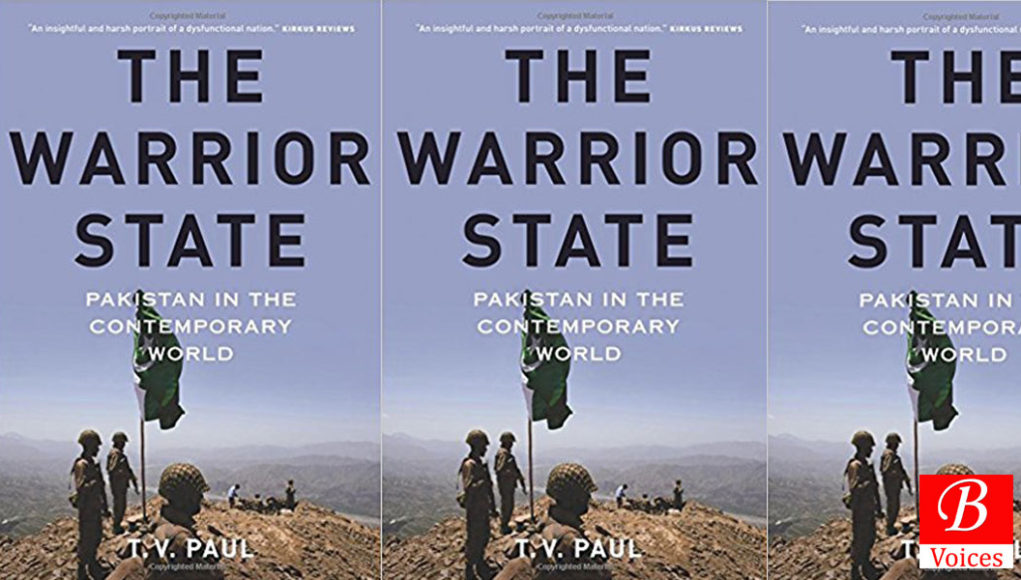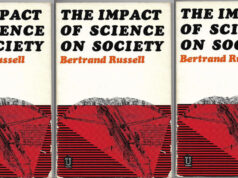Pakistan has been indulged in the geo-strategic struggle since its inception in 1947. T. V. Paul, the leading scholar of international security, regional security, and South Asia, explores the conundrum in his book, titled ‘The warrior state: Pakistan in the Contemporary World.’ He investigates the resource curse in convergence with the geographical curse to identify the major social, political and economic fallacies of Pakistan.
After Thirty Years War (1618-48), the treaty of Westphalia took place which gave birth to the rise of the sovereign nation-state system. This system got difficulties with the notion of sovereignty and encountered security dilemma in so many various ways. WWI and WWII could be regarded as textbook examples where the balance of power failed miserably; hence, providing the fact that war is the inevitable and real world is the realist world, unfortunately.
Generally, European political system was considered to be having unique relationship of war formulation and state development. Few analysts has pondered upon the fact that nation-state got internal social changes in the name of war preparation. The development led the government fall deeper into the roots of respective societies through bureaucratization, taxation and conspiration. This eventually led to the emotional formula of having feelings of patriotism and nationalism.
The overall mechanism initiated strong centralization in states where balance between nation building and state building was created through comprehensive economic policies. Keeping in view the levelling of societies and internal cohesiveness, Charles Tilly sums up the phenomena in the following words;
“War made the state and state made the war.”
But, the very same process can also lead to state collapse and wholesale destruction like in case of Austria-Hungary, Soviet Union( 1917 Revolution) and Germany during the two devastating World Wars. Soviet Union witnessed another failure during the Cold War period (1945-91) which unravelled the deep economic doldrums within the institutions and societal network.
Now comes the case of war-torn state of South Asia i.e., Pakistan. Regrettably, she lies among the weak states where nation building didn’t coincided with the development of state apparatus and, thus we witnessed the dismemberment in Dec 1971. Like European states, it does have centralized structure and realpolitik worldview but, unlike the European structure, it does have stratified societal nature with parochial political culture. Adding insult to injury, the political elite miserably failed in articulating comprehensive and systematic economic initiatives.
According to T.V. Paul, the idea of security centric approach carries a multitude of causes. The vital geo-political location and foreign donations have been the major reason of Pakistan’s Hobbesian point of view which encourages only one phenomena i.e., ‘all against all.’ Pakistan started entertaining patron-client relation because of the then geo-political competition between US and USSR. Then, there, comes the Afghan conundrum which has been replaced by current rivalry of US with China- the second emerging economic power. Former led to massive inflow of American dollars while latter gave CPEC (China Pakistan Economic Corridor). T.V. Paul termed these incentives as geo-political and foreign curse because of the various reasons. First, it has been the source of easy money for both the political and military elite of Pakistan. Second, it has freed the concerned authorities from taking any long-term economic policies and institutional reforms which have hampered the smooth democratization of the society. Third, tax collection has seen no serious concern. According to the 2010 report of New York Times, only 2% of the population is obliged to pay taxes. Third, the semi-feudal composition of polity is supporting the very interests of corporate military. They know the participant culture and political socialization will give way to the concept of accountability which could be detrimental to their pursuit of monetary interests.
In order to rationalize the failure of political establishment, a range of ideas have been inculcated in the society which T.V. Paul has elucidated briefly in his book. First, the South Asia Legacy honours the Muslims of Sub-continent as conquerors and heirs of Moghul Empire. Second, Pakistan has been created to protect the Muslim rights and, to practice the injunctions of Quran and Sunnah, freely. This exclusive approach is more harmful for minorities which have borne the brunt of several religious movements. Third, the two-nation theory encourages us to protect Islam keeping in view the twin cries i.e., ‘Islam is in danger’ and ‘The Islamic Republic of Pakistan’. Fourth, the conflict with India is inevitable which relates with one of the realist postulates that war is unavoidable. Fifth, India hasn’t accepted the 1947 partition and it can attack us anytime because of the notion of ‘Akhand Bharat.’ Sixth, fear of Indian enemy compels us to go for the pre-emptive strike. Seventh, there should be strategic depth in Afghanistan in order to curtail the Indian dominance.
He further explains the double standards of Washington. On one side they talk about democratic peace theory but on the other side they always sided with the military rule of Pakistan. Strategically, this was in convergence with their policies either against Soviet Union or Taliban. Same goes for the Saudi Arabia, WB (World Bank) and IMF (International Monetary Fund).
Pakistan has been encountering troubling events since its inception in 1947. At that time, 1935 Act was running the state machinery which was one of the brainchild of British colonial rule. This favoured strong central authority which Quaid also pursued in form of viceregal model of governance. The reasons for early years of instability comes out to be elitist authoritarianism, civil-military clash and lack of democratic norms within the political parties. In addition, we saw legitimacy, participation, and penetration crises which further aggravated the already beleaguered political system.
In this context, Pakistan became a garrison state. T.V. Paul defines Garrison state in the following words;
“A garrison state is characterized as a state which is pre-occupied with danger, one in which the specialists on violence are the most powerful societal group; the main function of the ruling elite is to skillfully guide the minds of men through symbolic manipulation and prevent the full utilization of state resources for non-military purposes.”
He then talks about Praetorian state which can be defined as under;
“A praetorian state is one in which the military frequently intervenes in national politics and dominates the political system.”
Pakistan, surprisingly, carries the characteristics of both types of states. As far as being the garrison state is concerned, one can easily view the presence of military ethos dominating the society. Military rule has been remained the fate of this country for over thirty years and this is because of the legitimacy they acquired initially. Moreover, the praetorian features can be gauged through recent MQM-PSP fiasco.
The book further explores religious dilemma and its very role in the creation and running of Pakistan. Religious factor has come out to be the double-edged sword. On one way, it has created identity crisis with respect to ethnic groups and other sectarian outfits. On the other side, it has radicalize the social sector. Extremism and terrorism has been the products of religious policies pursued by Bhutto, particularly, and Zia, most specifically. Current protest and hate speeches of TLY (Tahreek-e-Labaik Ya Rasool Allah) and JI demonstrates nothing but the previous traditions of use and misuse of religion which has always been anti-thesis of democracy, pluralism and tolerance.
T.V. Paul also suggests the progress of certain other Muslim and non-Muslim warrior states which took critical juncture and found the developmental ways to transform their societies. Turkey, Indonesia, Egypt, South Korea and Taiwan are the profound examples in this context. They all share few characteristics i.e., competent leadership, middle class mobilization, international pressure and evaluation of other democratic norms. Here, the onus of responsibility lies on able leadership which failed in overruling narrow ends and adopting pragmatic approaches which could have changed the face of historical and traditional narrative of parochialism.
Indeed, Pakistan is required to abandon the hyper-realpolitik policies both domestically and internationally if and only if it wishes to have progress in this globalized world. The Indian factor and Afghan conundrum must be pacified and several internal changes must be ensured like that of education, health care, good infrastructure, systematic economic strategies, political socialization and land reforms. And, most importantly, the leadership will play a key role in accordance with the paramount efforts both at external and internal phases as the only way out.
Author is a team member of Balochistan Voices and a Student of BS (Hons) Political Science in University of the Punjab, Lahore. She hails from Loralai District. Click here to read previous articles written by the author.
Disclaimer: Views expressed in this article are those of the author and Balochistan Voices not necessarily agrees with them.
Share your comments!








